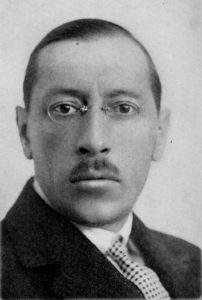
When discussing the long compositional life of Igor Stravinsky (he completed his first masterwork, The Firebird, in 1910; his last, Requiem Canticles, in 1966 [see Dr. Bob Prescribes for a post on the latter April 7, 2020]), his output is often conveniently divided into three large compositional “periods”: his “Russian period” (1909-1919); his neo-Classic/neo-tonal period (1920-1956, which includes a wide variety of presumably Baroque and Classical-era inspired works); and his late or “serial” (modern) music, 1957-1966.
Alas, like most such convenient divisions, these are broad generalizations and exceptions abound. (Apparently no one bothered to tell Stravinsky that his “Russian” period had concluded in 1919. Consequently, he had no qualms about composing Mavra in 1921. Mavra is a charming one-act opera buffa based on Alexander Pushkin’s rhymed story, The Little House in Kolomna. It is a rarely performed work; Tchaikovsky-like in its rich, bel canto lyricism and most Stravinskyan in its concision and rhythmic asymmetry, the latter an outgrowth of the Russian language itself. Likewise, Stravinsky’s Symphony in Three Movements of 1945 might just as well be titled Son of The Rite of Spring – or perhaps Beneath the Rite of Spring – so closely related are these two works composed 33 years apart.)
We likewise read that the “great masterworks” of Stravinsky’s Russian period are the three ballets he composed for the Ballets Russes in 1910, 1911, and 1912, respectively The Firebird, Petrushka, and The Rite of Spring.
This is incorrecto. It just so happens that Stravinsky’s single greatest “Russian” work – and we’re not talking here about the fantasy of Bronze Age Russia that is The Rite of Spring but rather, a work inspired by genuine Russian folk music, ritual, and culture – is Les Noces (“The Wedding”). It is a towering masterwork, completed in short score during World War One in 1917, but not finished in its entirety until 1923, when Stravinsky was ostensibly ensconced in his neo-Classic period. …
Continue reading, only on Patreon!
Become a Patron!